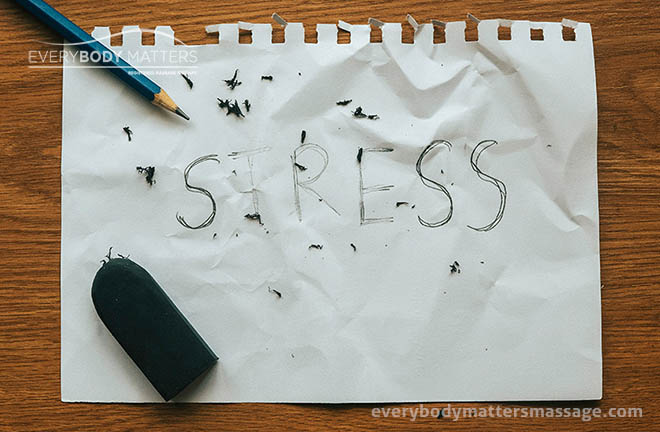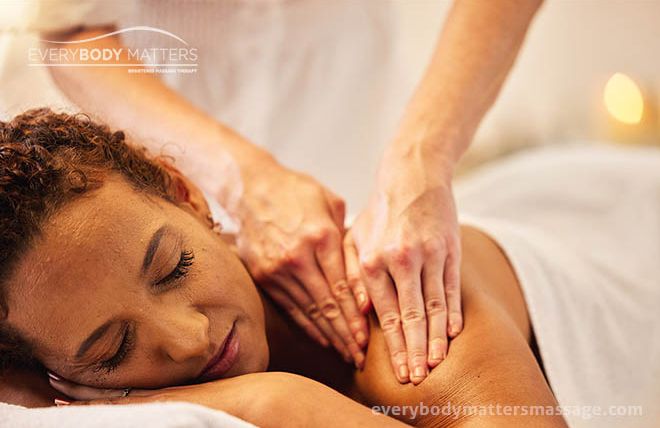Breaking the Stress Cycle: How Massage Therapy Can Reduce Anxiety
The Stress Epidemic

Stress is an inevitable part of life.
Whether we are dealing with work pressures, financial issues, relationship problems, or health concerns, stress can have a profound impact on our physical and emotional well-being. When we experience stress, our bodies respond by releasing hormones such as cortisol and adrenaline.
These hormones prepare us for fight or flight mode by increasing heart rate, blood pressure, and respiration. While these natural responses can be helpful in certain situations, chronic stress can have damaging effects on the body.It can lead to a weakened immune system, digestive problems, headaches, muscle tension, and even serious health conditions such as heart disease and diabetes. The impact of stress is not just physical; it can also affect our mental health by causing anxiety disorders and depression.
The Massage Therapy Solution
The good news is that there are many ways to manage stress effectively. One solution that has gained popularity in recent years is massage therapy.
While some may view massage as a luxury or indulgence reserved for special occasions or vacations, it's actually much more than that. Massage therapy has been used for centuries as a healing art form.
It involves the manipulation of soft tissue to promote relaxation and relieve tension in the body. By working with the muscles and connective tissue through varying degrees of pressure and strokes, massage therapists are able to help clients reduce pain and stiffness while increasing circulation throughout the body.
Although massage therapy may not be a cure-all for chronic stress or anxiety disorders alone, it's certainly worth adding to your toolbox of self-care practices. In the following sections of this article we will explore how massage therapy works on a scientific level to reduce anxiety levels in particular through endorphin release and lower cortisol levels.
The Science Behind Massage Therapy
There's a reason why massage therapy is often recommended as a treatment for stress and anxiety. The science behind it is fascinating. When you receive a massage, it triggers the release of neurotransmitters in your brain that help to relax your muscles and calm your mind.
One of the main ways that massage therapy affects the body is through the nervous system. Specifically, it triggers the parasympathetic nervous system, which is responsible for promoting relaxation and reducing stress.
This response allows your body to enter a state of rest and recovery, which can help improve overall health and wellbeing. Massage also has an impact on hormone levels in the body.
Cortisol is a hormone that's released in response to stress. When we experience chronic stress, cortisol levels can remain elevated, causing negative effects on our physical and mental health.
Massage therapy has been shown to reduce cortisol levels in the body, which can help combat these negative effects. In addition to reducing cortisol levels, massage therapy also triggers the release of endorphins - natural painkillers that promote feelings of happiness and relaxation.
These endorphins can have a powerful impact on our mood and overall sense of wellbeing. So not only does massage therapy reduce physical tension in our bodies, but it also helps us feel better emotionally too!
Types of Massage Therapy for Stress Reduction
Swedish Massage: The Classic Relaxation Technique
Swedish massage, also referred to as classic massage, is the widely preferred form of massage therapy in the Western world. This technique employs gentle, fluid strokes that aim to induce relaxation and alleviate tension.
During a session of Swedish massage, your therapist will employ a combination of gliding, kneading, tapping, and circular motions to manipulate your muscles and enhance circulation. One of the primary advantages of Swedish massage is its ability to reduce stress and anxiety.
By promoting relaxation and releasing muscle tension, this technique can help lower heart rate and blood pressure, while simultaneously increasing a sense of well-being. Additionally, Swedish massage has demonstrated its effectiveness in improving immune system function and facilitating better sleep..
Deep Tissue Massage: Targeted Pressure for Deep Tension Release
If you are grappling with chronic muscle pain or tension, deep tissue massage could be the ideal choice for you. This type of therapy utilizes intense pressure to reach the deeper layers of muscle tissue where tightness and knots often persist. Your therapist will employ slow strokes or friction techniques against the grain of your muscles to release adhesions and restore normal movement.
While deep tissue massage can be intense at times, it proves to be an effective method for alleviating chronic pain caused by injury or repetitive strain. It is also an excellent option for athletes or individuals engaged in rigorous physical activity on a regular basis.
Benefits Extending Beyond Relaxation
While relaxation is a fundamental aspect of massage therapy, the benefits extend far beyond a sense of calm and tranquility. Massage therapy has been shown to have a positive impact on various physical and mental health concerns, including improved sleep quality, reduced headaches and muscle pain, and increased mindfulness and self-awareness. Let's delve into how massage therapy can address these issues.
Benefits Beyond Relaxation
While relaxation is an essential aspect of massage therapy, the benefits go far beyond just feeling calm and collected. Massage therapy has been shown to have a positive impact on various physical and mental health concerns, including improved sleep quality, reduced headaches and muscle pain, and increased mindfulness and self-awareness. Let's delve into how massage therapy can help with these issues.
Improved Sleep Quality
If you struggle with obtaining restful sleep, you are not alone. Stress and anxiety can significantly affect our ability to fall asleep and maintain uninterrupted sleep throughout the night. Fortunately, massage therapy can help by reducing stress levels and promoting better sleep quality.
Studies indicate that receiving massage therapy before bedtime can increase the production of serotonin, the "feel-good" hormone that fosters happiness, while simultaneously reducing cortisol levels. Cortisol is responsible for the body's stress response and directly impacts our natural sleep rhythms.
Reduction in Physical Symptoms such as Headaches and Muscle Pain
One of the most immediate benefits of massage therapy is its ability to alleviate physical discomfort, including headaches and muscle pain. According to a study published in The Journal of Alternative Medicine, individuals who received regular massages experienced fewer headache symptoms compared to those who did not receive regular massages over time. Similarly, targeted pressure through deep tissue massage can relieve muscle tension caused by stress.
Increased Mindfulness and Self-Awareness
Massage therapy encourages us to focus on our breaths while being present in each moment during the session. By practicing mindfulness during a massage treatment, we are more likely to use this technique outside of our sessions too - leading us toward greater self-awareness overall. Mindfulness meditations have been shown to lead to more positive emotions like joy and happiness while reducing stress and anxiety.
Massage therapy can be a practical way to introduce mindfulness into your daily routine, even if it is only for an hour-long session of relaxation. By incorporating massage therapy into your self-care routine, you can experience a host of physical and mental health benefits beyond just feeling relaxed.
Improved sleep quality, reduced physical symptoms such as headaches and muscle pain, and increased mindfulness and self-awareness are just some of the benefits to consider. It's worth giving massage therapy a chance if you're looking for a natural way to reduce stress levels and improve overall well-being.
Incorporating Massage Therapy into Your Life
Now that you understand the benefits of massage therapy for combatting stress and anxiety, the question becomes: how do you incorporate it into your life? One important factor to consider is finding a reputable massage therapist. Not all massage therapists are created equal, and it's important to do some research before scheduling an appointment.
Start by asking friends or family members for recommendations. If you don't know anyone who has gotten a massage before, turn to online reviews.
Look for a therapist who is certified and has experience working with clients who have similar needs as yours. You can also check if the therapist is a member of professional organizations.
Tips for Finding a Reputable Massage Therapist
- Ask friends or family members for recommendations
- Read online reviews
- Check for certifications and professional memberships
- Consider location and convenience - you don't want to add extra stress by having to travel far or navigate difficult parking situations
- Schedule consultations with potential therapists to discuss your needs and goals
- Trust your gut - if something doesn't feel right, keep looking until you find the right fit
Frequency and Duration Recommendations for Optimal Stress Reduction
The frequency and duration of massages will depend on several factors, including your budget, schedule, level of stress, and physical condition. Generally speaking, once a month is considered a good starting point for regular massages.
However, if you're dealing with high levels of stress or chronic pain, more frequent sessions may be necessary. The duration of each session can also vary depending on your goals and preferences.
A typical massage session lasts for 60-90 minutes, but some therapists offer shorter or longer sessions depending on the client's needs and budget. Ultimately, the best approach is to listen to your body and adjust accordingly.
If you find that monthly massages aren't providing enough relief, try increasing the frequency or duration of your sessions. And don't forget that massage therapy is just one tool in a comprehensive stress reduction plan that should also include exercise, healthy eating habits, and other self-care practices.
Conclusion: Prioritizing Self-Care with Massage Therapy
Massage therapy is not just a luxury, but a necessary tool in breaking the vicious cycle of stress and anxiety. By working with the body's natural processes, massage therapy can help reduce cortisol levels, increase endorphins, and promote better sleep quality. The benefits of regular massage can extend beyond relaxation, helping to alleviate physical symptoms such as headaches and muscle pain while increasing mindfulness and self-awareness.
It is important to prioritize self-care through practices such as massage therapy in order to improve overall well-being. Taking time away from work or other responsibilities to focus on oneself can have a positive impact on relationships, productivity, and overall happiness.
While some may view self-care as indulgent or unnecessary, it is crucial for maintaining good mental health. Finding a reputable massage therapist can also be key in fully experiencing the benefits of massage therapy.
Researching reviews or asking for referrals from friends or family members can help ensure that the therapist has proper training and experience. It is also important to communicate any concerns or specific needs with the therapist beforehand in order to receive the most customized care possible.
Incorporating regular massages into one's routine may seem daunting at first due to cost or time constraints, but it is important to remember that investing in one's own well-being will pay off in the long run. By prioritizing self-care through practices such as massage therapy, individuals can break free from the stress cycle and lead happier, healthier lives.
Do you live in the GTA?
Ready to book your massage?
It's quick and easy, just click the button below and follow the instructions. You will receive confirmation and all the patient intake forms via email. Kindly read, complete and sign intake and consent forms, including cancellation policy. I believe everyone's time is valuable, and as a courtesy to everyone, we thank you for being on time. Late arrivals can only be extended to the time remaining in the scheduled session. If you cancel with less than 24 hours notice, or miss your appointment, you will be charged for the entire amount of your scheduled treatment. Insurance does not reimburse claims for late cancel lations or missed appointments.
If you don't see the time you are looking for, please add yourself to the wait list.
If an appointment becomes available, you wil l be given priority.






